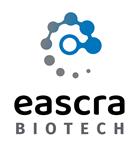Boston Eascra Biotech, a new start-up building the next generation of therapeutic nanotechnologies, announced NASA has selected the company, along with others for an in-space manufacturing project.
Boston, Dec. 06, 2022 (GLOBE NEWSWIRE) --
NASA Awards Eascra Biotech $1.8M for In-Space Manufacturing
Eascra partners with University of Connecticut and Axiom Space to develop in-space manufacturing processes
Boston (December 6, 2022) Eascra Biotech, a new start-up building the next generation of therapeutic nanotechnologies, today announced NASA has selected the company, along with others for an in-space manufacturing project. Eascra Biotech, in partnership with University of Connecticut and Axiom Space, is one of eight groups receivinga total of $21 million in grantsfrom NASA. Their project focuses on the biomimetic fabrication of DNA-inspired Janus base multifunctional nanomaterials (JBNs) in space. The Eascra/UConn team will receive $1.8M over the next two years to complete their work.
“This extraordinary team gives us a unique opportunity to evaluate our technology and manufacturing processes,” said Mari Anne Snow, Eascra’s CEO and co-founder. “The combined subject matter expertise and specialized insight will help us deliver out-of-this-world solutions, advancing treatment options for many chronic conditions and unmet medical needs. The ability to manufacture in low or no gravity allows us to ramp up the process and increases quality beyond anything currently available on earth.”
In-space manufacturing offers many benefits
NASA provides funding to help prove the market potential of low-Earth orbit manufacturing, spurring innovation and accelerating development of the budding space economy. Manufacturing in low or no gravity environments can lead to higher quality products with fewer defects.
The UConn/Eascra team expects to establish the optimal in-space manufacturing process for their products. Microgravity creates more orderly structures and higher levels of homogeneity than possible with terrestrial methods. This improved efficacy would open opportunities for more effective mRNA therapeutic delivery options and result in an advanced delivery system for a variety of therapeutic treatments and cartilage tissue repair and regeneration solutions.
This mission requires a team approach
Axiom Space is guided by the vision of a thriving platform in space that benefits every human everywhere. As the leading provider of human spaceflight services and the developer of human-rated space infrastructure, Axiom Space operates end-to-end missions to the International Space Station today, while building its successor, Axiom Station, the first permanent commercial destination in low-Earth orbit. Axiom Station will offer companies like Eascra access to capabilities for in-space manufacturing of biomedical products that benefit life on Earth.
The Aerospace Corporation was tasked with providing technical and business expertise and analysis in support of NASA’s evaluation of In Space Production Application (InSPA) proposals. The group will provide continued support during planning, preparation, and execution of the demonstrations on the International Space Station.
The Institute for Defense Analyses (IDA) helped inform NASA’s strategy and plans for enabling in-space manufacturing and developing a commercial low-Earth orbit economy.
Eascra is working with Janus base nanomaterials
Named for the two-faced Roman god, Janus base nanomaterials (JBNs) have two or more distinct physical properties which allows different kinds of chemistry to occur on the same particle. The biomimetic or controlled self-assembly of DNA-inspired JBNs, makes them the perfect candidates for in-space production. These JBNs will be used as effective, safe, and stable delivery vehicles for RNA therapeutics, gene editing and vaccines, as well as first-in-kind cell-free, injectable scaffolds for regenerative medicine. Eascra’s first target market is a new, advanced approach to osteoarthritis treatment and orthopedic tissue repair and regeneration.
Eascra intends to introduce nanomaterials in three different product areas:
- JBNp™, a new delivery platform for mRNA therapeutics and gene editing that can successfully pass through “difficult-to-infiltrate” tissue barriers. JBNp™ is room-temperature stable.
- JBNm™ is a revolutionary cell-free injectable scaffold for use in orthopedic applications involving cartilage repair and regeneration.
- JBNm-Tissue Chip™ simulates knee joints and other tissues on a microchip for accelerated biomedical research and drug testing.
Dr. Yupeng Chen, associate professor of Biomedical Engineering at University of Connecticut, is the co-founder of Eascra Biotech. He created the Eascra JBN product line to overcome many of the constraints of currently available nanotechnology.
“I was a former chemist and science fiction enthusiast,” said Chen. “I’ve always been fascinated with nanotechnology and space travel, but I was frustrated with the limits of the existing nanotechnologies for medical applications, and I simply wasn’t astronaut material. I couldn’t do anything about the astronaut problem, but I could switch to biomedical engineering. This allowed me to combine my knowledge of chemistry with knowledge of the human system to develop a more effective nanomaterial solution for advanced medical applications. I hope the resulting JBN product family will provide meaningful medical advances.
“In addition, as a NASA awardee, I am now conducting my work in space. I can participate in the advancement of science and the creation of a thriving space economy.”
About Eascra Biotech
Eascra Biotech is focused on the development of DNA-inspired Janus base nanostructures to create a family of safe, versatile, and temperature stable nanomaterials for biomedical applications, enhancing the therapeutic efficacy of drug treatments for a variety of chronic conditions and medical needs. Eascra’s novel family of Janus base nanomaterials provide highly effective solutions for:
- mRNA and gene editing delivery systems without toxic side effects.
- Tissue engineering and regenerative medicine for orthopedic applications.
- Accelerated biomedical research and drug testing on simulated tissues-on-chips.

Media Contact: Bobbie Carlton, Carlton PR & Marketing 781-718-7619 Bobbie@carltonprmarketing.com





